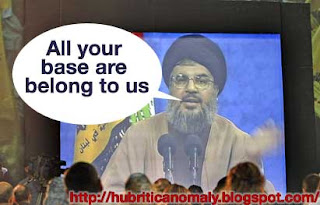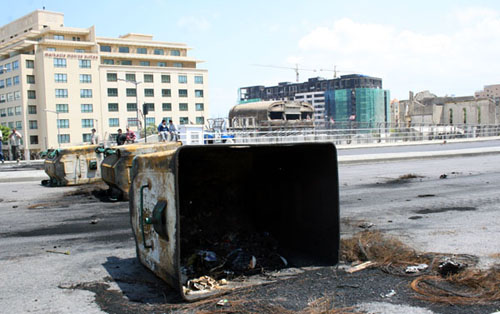2 Nil to Hezbollah

Calm returns to Beirut's streets
Lebanon's opposition has begun withdrawing its fighters from the streets of Beirut, handing control to the army, after seizing much of the city in battles with government supporters.
Hezbollah, which heads the opposition, vowed to end its takeover of west Beirut on Saturday, after the army overturned government measures against them.
"The opposition welcomes the army's decision and will proceed with the withdrawal of all its armed elements so that control of the capital is handed over to the military," an opposition statement said.
Stefan Christoff: First, can you describe the current situation in Beirut?
Samah Idriss: Now everything is relatively calm. All the offices of the government-backed Future Movement in West Beirut have surrendered and many of the pro-government "fighters," many who were invited to come from northern Lebanon, often without even knowing that they were going to fight, have surrendered to the opposition and the opposition has handed these people and offices over to the Lebanese army.
Now that the forces from the March 14th movement have lost this battle, pro-government forces claim that they weren't preparing for a war, that they aren't organizing armed militias and that they weren't instigating the fighting, while claiming that Hizballah is acting on behalf of Iran and Syria.
It is critical to remember that this current situation started when the Lebanese government, a couple days ago, decided to declare the Hizballah communications system or independent telephone grid as illegal. This is critical because this communications system was a major reason behind Hizballah's victory against Israel in July 2006. Given that the Hizballah system isn't wireless it is harder for Israel or the US to crack or decode this communications network. This communication system was key to Hizballah preventing Israeli forces from knowing the positions and movements of Hizballah and it's leadership during the war in 2006.
So this current scenario commenced with an instigation from the western-backed government. Additionally the government wanted to kick out a person in charge at the international airport in Beirut who is close to Hizballah, in order to replace them with another person who would not be able to assist Hizballah to know who travels in and out at the airport.
These two actions from the government, the declaration of Hizballah's communication network as illegal and the attempt to oust a Hizballah-sympathetic person at Beirut's international airport, instigated the attack from the opposition, led by Hizballah.
West Beirut is now under the control of the Lebanese army, after the opposition took over the party offices representing the March 14th movement. Currently it's not clear if things will develop in other areas in Lebanon such as in the mountains; this remains unclear.
SC: Now concerning the way that the current situation is being reported in the western press, we are reading a basic depiction that involves armed clashes between pro-government militias and Hizballah supporters throughout Beirut. Also there is a focus on distilling the current scenario into sectarian terms, breaking down the division as fought between Sunni and Shia forces. Also, you highlighted that Hizballah or opposition forces have handed over certain pro-government offices or Future Movement offices to the Lebanese army, which is not being widely reported in the western press. Mainstream media in North America are reporting that West Beirut is under Hizballah's control. In this light could you offer your critiques towards the mainstream media's coverage concerning the events in Beirut within the last 48 hours, both western media and media in the Middle East?
SI: Media that are allied with the government in Lebanon aims to present the current situation simply as sectarian strife. ... First it's important to highlight that Beirut was never strictly Sunni, while the people who are now fighting for the opposition, many belong to Beirut, live in Beirut, a city that has never been just Sunni but a mixture of all religious sects in Lebanon. This is one critical point.
Clearly there is a strategy from the government and pro-government forces to portray Hizballah as the outsiders, to try to portray Hizballah as a force coming to change the nature of Beirut by bringing in Shi'ite elements, Iranian elements, Persian elements, barbarian elements, etc. All oriental stereotypes that mainstream western media and some mainstream Arab media will quickly adopt. It is not certain, however, that this portrayal for Hizballah could work in the Arab media because Hizballah is widely respected as the major defender for the Arab cause, for the Palestinian cause.
Across the Middle East the mainstream Sunni populations don't view Hizballah or its leader Hassan Nasrallah as a sectarian leader or simply a Shi'ite leader. However, the mainstream pro-government media in Lebanon attempt to portray Hizballah as a completely sectarian movement, in tune with the political lines fostered by the governments of Saudi Arabia, Egypt, Jordan, France and the US.
Government forces in Lebanon claim they represent a peaceful vision for the country with their common slogan, "I Love Life," while claiming that Lebanon is being invaded by the violent Hizballah now in West Beirut.
and check this out:
Pacifism in Lebanon. While Amal militia men were roaming the streets of Beirut, Amal's TV (NBN TV) was airing documentary on Gandhi. I am not making this up . . .
Beirut Saturday 10 May
Reports are coming in that the army is sweeping up pro-government supporters in west Beirut. They are also rounding up Al-Qaeda sympathisers. There have been confrontations with Future Current supporters in Akkar in the north, Aley in the mountains, and in the south.
There are strong indications that the army has been coordinating with the opposition during the fighting.
It now seems clear that Hariri's Future Current in west Beirut has collapsed like a house of cards.
TV is showing angry funerals in Sunni areas of Beirut. Amal gunmen fired on the procession killing two.
Walid Jumblat's militia, in contrast to Hezbollah:
'Unfortunate incident'
In Beirut, 16 people were killed, two of them at a funeral procession for an earlier victim of the fighting, and there were reports that violence had spilled out of the capital and into other parts of the country.
Hezbollah said it blamed Walid Jumblatt, the pro-government Druze leader, for the death of at least two of its members in Aley, east of Beirut.
Jumblatt admitted there had been "an unfortunate incident" in the predominantly Druze and Christian town, in which "three people" had been killed.
"Two bodies were found and turned over to the army," he said.
He did not admit his supporters were responsible, but said if unconfirmed reports that the victims had been tortured proved to be true, he would "personally take responsibility for it".
Beirut Finally . . . The Fuller Picture

and well known Vampire
Washington pointed the finger at Iran and Syria - both of which back Hezbollah - for the violence, saying they must be held to account.
"The United States is consulting with other governments in the region and with the UN Security Council about measures that must be taken to hold those responsible for the violence in Beirut accountable," the White House said.
Mammoth war preps roundup :
On April 8, 2008, Bernard Kouchner, France’s top diplomat and head of the French Foreign Ministry, stated that Hezbollah was no longer “a domestic issue for Lebanon,” and that the Hezbollah’s weapons were a cause for serious international concern. A few days later, Fouad Siniora announced that the time for internal dialogue was over in Lebanon, while Nabih Beri was in Damascus trying to get Arab League support for new intra-Lebanese political dialogue.
The third expanded ministerial conference of the neighbouring countries of Iraq, held in Kuwait on April 22, 2008, also discussed Lebanon. The US, Saudi Arabia, France, Britain, and several other Arab states all sought to present Hezbollah as an international concern. UN Secretary-General Ban Ki-moon released a report claiming that Hezbollah was an international problem.
All these events were aimed at internationalizing Hezbollah as a threat, and justifying US and NATO intervention in Lebanon.
These efforts entered a new phase in Lebanon too. The Hariri-led March 14 Alliance declared that it would take legal action against Hezbollah, because of a camera network monitoring Lebanon’s main airport and a telecomms network setup by the group. All this was done in coordination of the March 14 Alliance with US and Saudi Arabian diplomats in Beirut.
Labels: Beirut, Bernard Kouchner, CIA, Dahlan, Dead People, Fouad Siniora, Hezbollah, Houston, Israel, Jumblat, Lebanon, Policemen, Roland Carnaby, Shiite, Sunni, Syria, US
DISCLAIMER:THE POSTING OF STORIES, COMMENTARIES, REPORTS, DOCUMENTS AND LINKS (EMBEDDED OR OTHERWISE) ON THIS SITE DOES NOT IN ANY WAY, SHAPE OR FORM, IMPLIED OR OTHERWISE, NECESSARILY EXPRESS OR SUGGEST ENDORSEMENT OR SUPPORT OF ANY OF SUCH POSTED MATERIAL OR PARTS THEREIN.






0 Comments:
Post a Comment
<< Home